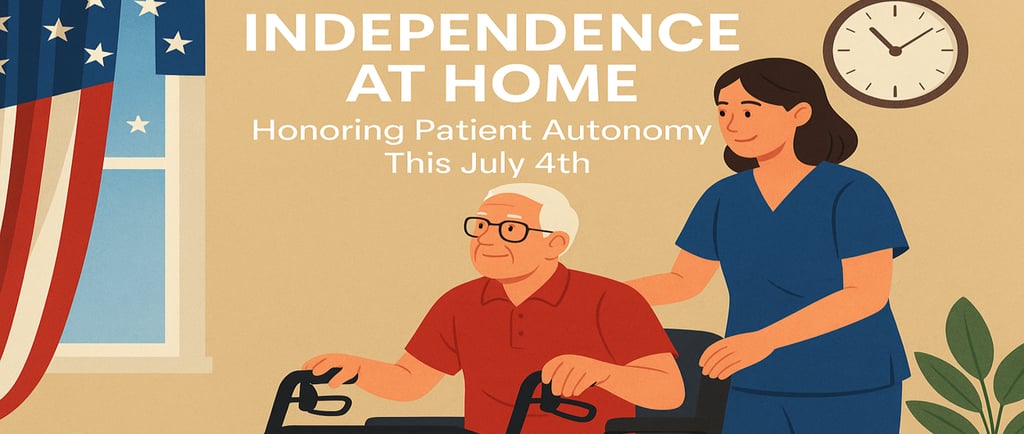Independence at Home: Honoring Patient Autonomy this July 4th
As we celebrate America’s freedom this July 4th, Avanta Care honors a quieter kind of independence—our patients’ right to dignity and choice in their care. Through personalized homecare plans, mobility support, and respectful routines, we help individuals reclaim control in their daily lives. Because independence isn’t just a holiday—it’s a goal we work toward every day.
7/4/20254 min read


The Essence of Independence
Independence is often celebrated as a hallmark of national pride on July 4th, yet its importance transcends this singular occasion. At its core, independence embodies personal autonomy, particularly within the healthcare sphere, where individuals often face choices that significantly affect their wellbeing. For patients, the ability to make informed decisions regarding their healthcare is crucial to preserving dignity and respect. It is essential to acknowledge that autonomy should be honored not just during festive observances but throughout the entirety of the year.
The right to define one’s healthcare journey empowers individuals. Each person perceives independence differently, influenced by their experiences, culture, and personal values. For some, independence may mean managing their health conditions with minimal intervention, while for others, it may involve seeking comprehensive support to navigate complex medical decisions. Recognizing this diversity is vital for healthcare providers, who must tailor their approaches to meet the unique needs and preferences of each patient, allowing for a more personalized care plan that respects the patient's autonomy.
Furthermore, fostering independence in healthcare can lead to improved health outcomes and higher satisfaction. When patients have a voice in their treatment choices, they often feel more invested and motivated to adhere to their healthcare plans. This shift from a paternalistic model of care to one that promotes shared decision-making illustrates the fundamental shift towards patient-centered care, which is increasingly recognized as best practice in healthcare settings.
In essence, independence is not merely an ideal celebrated once a year, but a continuous journey that encompasses every individual’s right to choose. By honoring this autonomy daily, we can collectively contribute to a healthcare framework that respects and uplifts the dignity of all patients.
Personalized Homecare: A Path to Empowerment
Personalized homecare plays a crucial role in supporting individuals to achieve autonomy and maintain independence within the comfort of their own homes. By implementing tailored care plans that take into account each patient's unique needs, preferences, and lifestyle choices, care providers can create an empowering environment that fosters patient autonomy. This approach to homecare not only respects the individuality of patients but also acknowledges their right to make informed decisions regarding their own care.
The benefits of personalized homecare are multifaceted. Firstly, such tailor-made strategies are instrumental in addressing specific health conditions while promoting overall well-being. For instance, a care plan designed around a patient's medical history can lead to more effective treatments and improved health outcomes. Additionally, by incorporating elements that resonate with a patient's personal life—such as encouraging hobbies, social interactions, and preferred routines—care providers can assist in creating a more gratifying living experience.
Furthermore, the role of care providers is pivotal in fostering a supportive environment that embraces patient choice. They are trained to actively listen to patients and engage them in discussions about their care, ensuring that they feel heard and valued. Through this collaboration, care providers can help individuals understand their options and encourage them to take an active role in decision-making. This empowerment ultimately leads to increased satisfaction with the care received and enhances the quality of life for those receiving homecare services.
Overall, personalized homecare embodies a commitment to honoring patient autonomy. By designing care strategies that prioritize individual preferences and needs, we can promote a more respectful and compassionate approach to health management. Thus, personalized homecare serves not only as a means to address medical concerns but also as a vital avenue for individuals to maintain their independence and dignity at home.
Mobility Support: Enabling Freedom of Movement
Promoting patient autonomy hinges significantly on mobility support, which plays a vital role in enhancing independence at home. For individuals with limited mobility, various aids and services can facilitate movement and accessibility throughout their living environment. Recognizing the importance of these mobility aids—such as walkers, wheelchairs, and lift chairs—is crucial in empowering patients to navigate their homes with confidence. These devices are tailored to provide the needed assistance while ensuring individuals can maintain as much independence as possible.
In addition to traditional mobility aids, modern advancements have introduced a range of products designed to enhance mobility in more nuanced ways. For example, stairlifts allow those with mobility challenges to move safely between levels of their home, while grab bars and non-slip mats are instrumental in preventing falls and ensuring safety in bathrooms and hallways. These solutions contribute significantly to a patient's ability to remain active and engaged in daily activities.
The availability of professional services, such as physical therapy and rehabilitation programs, also plays a crucial role in promoting mobility. Skilled therapists work with patients to develop personalized plans that focus on strength, flexibility, and endurance, ultimately enhancing their ability to move safely within their homes. This rehabilitative support not only contributes to physical well-being but also fosters a sense of self-reliance and control.
When individuals feel empowered to move freely in their environments, their overall quality of life improves. The emotional and psychological benefits of enhanced mobility are profound, as individuals experience a greater sense of freedom and self-determination. As we honor patient autonomy, it is imperative to continue investing in effective mobility support systems that enable individuals to lead fulfilling lives at home.
Respectful Routines: Cultivating Independence Every Day
In the pursuit of enhancing patient autonomy, the establishment of respectful routines plays a pivotal role. These routines not only foster a sense of stability but also empower individuals to make informed choices about their daily lives. Consistency in care routines can significantly contribute to the well-being of patients, allowing them to feel secure and respected in their intimate environments. By recognizing and reinforcing the preferences and habits of each individual, caregivers can promote an atmosphere that encourages independence.
Respect for patient autonomy begins with understanding the unique needs and desires of the individual. This entails tailoring routines to align with their lifestyle, preferences, and capabilities. For instance, caregivers might collaborate with patients to develop morning rituals or meal times that suit their wishes. Implementing such personalized routines not only conveys acknowledgment of their preferences but also promotes a sense of self-efficacy. When patients are actively involved in determining the structure of their care, they are more likely to engage with daily activities positively, reinforcing their independence.
Moreover, adapting routines to fit the individual can significantly enhance their emotional and physical well-being. Acknowledging and incorporating their preferred methods of completing tasks can cultivate a secure environment that supports self-sufficiency. This approach not only respects their autonomy but also helps in building trust between patients and caregivers, which is fundamental for effective care. The combination of routine and respect fosters a collaborative dynamic, where individuals feel valued and their autonomy is upheld. As such, cultivating everyday respectful routines can greatly influence a patient's confidence and enhance their quality of life, leading to a more fulfilling and independent existence.


